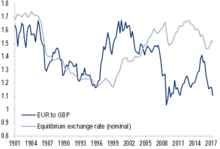Using long term macroeconomic data, sterling looks to be significantly undervalued versus the euro (see graph). Without Brexit, we could be looking at, what we call, an ‘equilibrium’ value of around 1.50 euros to the pound, taking into account economic fundamentals only (relative prices, relative productivity and relative expected savings).

Assuming Brexit, we’re working on the basis of circa €1.3 to £1 – but it could take a number of years to get there!
Productivity is a key driver of our data used in this calculation – particularly productivity in the tradable goods sectors. This is likely to suffer after Brexit due to non-tariff barriers to trade (think complying with overseas regulation and customs regimes). That said productivity growth in Europe has been weak, and is unlikely to surge ahead while the UK economy recalibrates, somewhat limiting the damage to the equilibrium rate. If the European project revives around a new Macron/Merkel nexus, then further gains from integration may lower the equilibrium rate a little further via improving Eurozone productivity.
Although the long-run economic value of the pound would shift lower in a ‘hard Brexit’ scenario (i.e. no special deal), primarily due to the impact on productivity, the actual exchange rate is so far below the economic equilibrium value that we expect the pound to rise on a long-term basis in any scenario. It is really just a question of speed.
Unfortunately, such long-term analysis does not help us forecast currencies on a 6-12 month view, and the newspaper headlines generated by ongoing Brexit negotiations could well drive exchange rate volatility.
Until June, the EUR/GBP exchange rate over the last couple of years has closely tracked changes in relative interest rate expectations (i.e. what the market thinks interest rates will be in Europe in 3 years’ time relative to what they think they will be in the UK). This lends some shorter-term support to the pound, and indeed could favour sterling further if the run of strong data in the Eurozone starts to decline.
CURRENCIES DIRECT
You may be aware that at The Spectrum IFA Group we refer our clients to Currencies Direct in the UK for foreign exchange transactions.
I had a recent conversation with them about the number of new entrants into their market space and the availability of competitor firms and how it was affecting their business model. However, they informed me that they have some of the most competitive foreign exchange rates on the market, because of their size, and they are happy to discuss beating rates offered by existing long terms providers and also the newer online only entrants into this market place.
If you are making transfers through an existing service or want/need to start then let me know on gareth.horsfall@spectrum-ifa.com and I can introduce you to their representatives to discuss their competitive rates.
As my grandma used to say to me:
“IF YOU LOOK AFTER THE PENNIES THE POUNDS WILL LOOK AFTER THEMSELVES”
